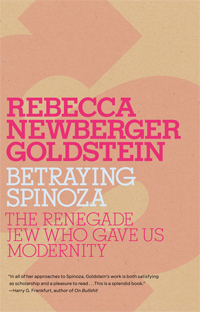Betraying Spinoza: The Renegade Jew Who Gave Us Modernity
REBECCA GOLDSTEIN
Schocken Books, 2009, 287 pp., $13.95 paper
 When a friend gave me a copy of “Betraying Spinoza,” by Rebecca Goldstein (no relation), my first thought was that it was a long way from my more usual mystery- and spy-book reading. I opened it cautiously and soon found that this marvelous book was itself a bit of higher-order sleuthing—a beautifully written and surprisingly compelling blend of history, religion, philosophy, and biography, re-creating the life and times of Judaism’s most famous heretic.
When a friend gave me a copy of “Betraying Spinoza,” by Rebecca Goldstein (no relation), my first thought was that it was a long way from my more usual mystery- and spy-book reading. I opened it cautiously and soon found that this marvelous book was itself a bit of higher-order sleuthing—a beautifully written and surprisingly compelling blend of history, religion, philosophy, and biography, re-creating the life and times of Judaism’s most famous heretic.
I first came across Spinoza in a philosophy class in college, and although his great work, “The Ethics,” was difficult to slog through, something in his understanding of the world and the power of reason resonated deeply. A couple of years later, when I was in the Peace Corps in Thailand and first becoming interested in Buddhism, I went to the temple with my dog-eared copy of “The Ethics” in hand, wanting to engage the monks in some philosophic repartee. In the end, the monks advised me to begin meditating. Until reading Goldstein’s book, Spinoza had become simply a memory of something I once valued.
After all these years, reading “Betraying Spinoza” reawakened my understanding of why I was so taken with his work in the first place. Like any great teacher, Rebecca Goldstein pushes us to the edge of feeling the liberating power of ideas. As she writes of Spinoza, “He sought to demonstrate that the truths of ethics have their source in the human condition and nowhere else. He sought to prove that our common human nature reveals why we must treat one another with utmost dignity, and, too, that our common human nature is itself transformed in our knowing of it.”
“Betraying Spinoza” is a treat.
Thank you for subscribing to Tricycle! As a nonprofit, we depend on readers like you to keep Buddhist teachings and practices widely available.